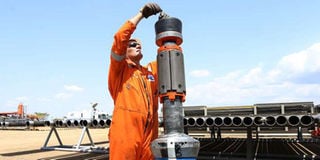Uganda sets tough terms for Kenya on oil pipeline

A worker at Ngamia 3 oil exploration site in Turkana County on July 13, 2014. FILE | BILLY MUTAI |
What you need to know:
Kenya guarantees it will, at all times, offer cheaper transit fees.
Uganda wants Kenya to provide security, agree on financing arrangements and start construction of the pipeline without delays.
As it currently stands, Kenya is straining as Uganda’s pre-conditions threaten to blow up the cost burdens of the pipeline.
Uganda agreed to take the Northern route to export her crude oil subject to three conditions. Among them is that Kenya guarantees it will, at all times, offer cheaper transit fees or tariff than all other possible routes.
Details seen by the Smart Company are, however, sketchy. It is not clear, for instance, how prices for the “other possible routes” will be determined for comparison. Though Kenya has agreed to take the risk, this will only be determined by a detailed design on the actual construction of the pipeline, ‘The Front End Engineering Design (FEED).’
Mr Daniel Kiptoo, adviser to Energy and Petroleum Cabinet Secretary, said Toyota Tsusho design estimated that the transit fee for oil per barrel would be $15.2. Uganda’s design done by an independent firm estimated a fee of $15.7.
“Uganda said any fee above $15.7 will be incurred by Kenya. This, however, is not the actual fee. We will know the real transit fee when we do the FEED which will give us a firm number to work with,’ said Mr Kiptoo.
PROVIDE SECURITY
Both countries are currently in talks to get a designer for the project. Uganda also wants Kenya to provide security as the work progresses, agree on financing arrangements and start construction of the pipeline without delays.
Kenya was initially uncomfortable with some of the conditions set by Uganda.
The Daily Monitor on Thursday reported that Uganda’s Energy minister Irene Muloni noted concerns among members of the delegation that accompanied President Uhuru Kenyatta to the country.
“It is not like it was a misunderstanding but rather they were uncomfortable with some of the terms. The issue of financing was premature before we agree on the structure of the project in terms of ownership,” Ms Muloni said.
As it currently stands, Kenya is straining as Uganda’s pre-conditions threaten to blow up the cost burdens of the pipeline.
The project has had its ups and downs with Kenya using Toyota Tsusho to do its design while Uganda opted for Total. Nairobi went for Northern route while Kampala chose the Southern route. This is what delayed the final decision.
OIL REFINERY
Despite taking the Northern route, Uganda is keen on one that would be of benefit from its oil refinery.
The facility is supported by international oil companies -UK’s Tullow Oil, France’s Total E&P and China’s Cnooc currently operating in Uganda.
The tender for the new refinery has been awarded to RT Global Resources, a consortium led by Russia’s Rostec.
Kenya has to fund most of the route than her neighbour because it has the longer side. It was also uncomfortable with Uganda’s move to contract Total into conducting a parallel study that would prove the viability of the oil pipeline route.
Between June and August, there were several meetings with both countries resulting into heated debates with Uganda defending the Southern route while Kenya chose the Northern version.
NORTHERN ROUTE
On June 1, heads of states of both countries ordered involved ministers to harmonise the reports by both Toyota and Total.
Toyota was then given an additional contract to review both reports.
The result of the review was the Northern route.
Both President Kenyatta and Museveni then settled on the Northern route.
At the moment, the two countries are looking at how to split costs.
Kenya and Tullow, and Africa Oil have signed a contract on cost sharing. Uganda, on the other hand, has a contract with UK’s Tullow Oil PLC, France’s Total E&P and China’s Cnooc.




